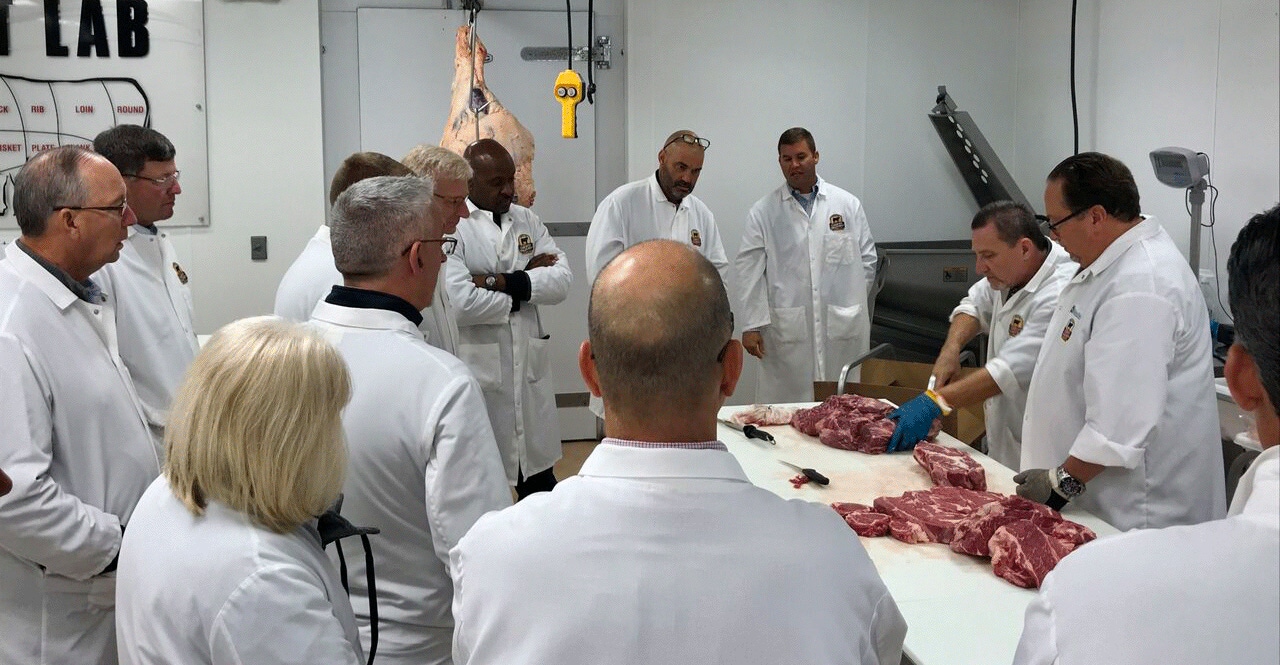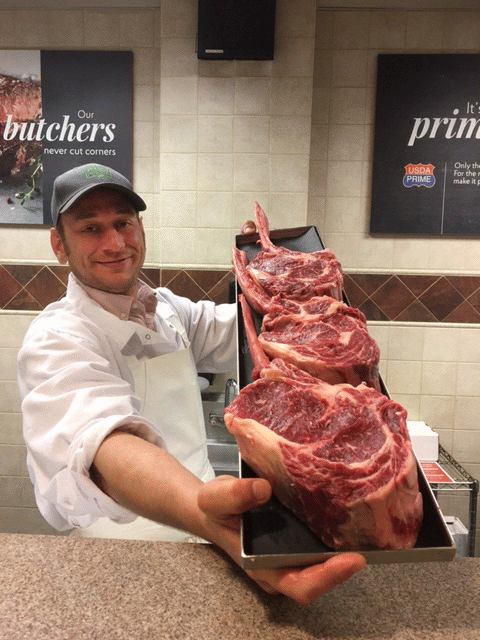Meat departments that are a cut aboveMeat departments that are a cut above
Butchers and store associates help shoppers take the guesswork out of meat purchases and boost the department’s reputation and revenues
September 13, 2018

The butcher’s traditional role of just slicing meat in a backroom will no longer cut it in an increasingly complex merchandising environment.
As meat cases display a wider range of proteins with more product claims, it is becoming vital for department staffers to have both the knowledge and the communication skills to educate and advise shoppers about selections.
“Consumers are thirsty for information,” said Rick Stein, vice president of fresh foods for the Arlington, Va.-based Food Marketing Institute (FMI). “They want to know where the product came from and the difference between alternatives, and nobody can do a better job in explaining that than the butcher.”
With meat packages displaying greater arrays of attributes and certifications, consumers often find the messaging “more confusing than clarifying,” he said.
“Shoppers don’t understand the different cuts of meat and how to cook them,” said Pete Eckes, president and chief executive officer of Global Perishable Strategies, a Windsor, Colo.-based perishables consulting firm and the former senior director of business development for meat, poultry and seafood for Walmart Inc. “A butcher can use his or her knowledge to help consumers with these purchasing decisions.”
He added, however, that “unfortunately, we have too many butchers that cut their meat and never leave the back room. We need a butcher, chef or dietitian that spends more time in front of the meat case talking to consumers.”
The benefits from having knowledgeable meat department associates playing customer service roles can be powerful.
Eckes said a Walmart test at two Supercenter locations in which trained associates engaged customers and offered meal solution ideas resulted in an approximate 20% sales growth.
“Based on that success, we put Walmart associates in multiple stores,” he said. “But without proper training, the test failed miserably.”
Consumer education at the meat case also can boost purchases of a wider variety of proteins, said Anne-Marie Roerink, principal of 210 Analytics LLC, a San Antonio-based market research and marketing strategies firm.
Indeed, she stated that her research for The Power of Meat 2018 report found that 83% of shoppers buy a “mere handful” of meat and poultry selections, even though 42% of the consumers said they will be willing to explore if they were advised.
“It is clear that the more meat affinity and knowledge shoppers have, the more often meat and poultry are included in the dinner lineup,” she said. “We cannot expect a different outcome if people are stuck in the same, limiting shopping routine. Retailers have been focusing on technical meat-cutting skills, but that doesn’t necessarily translate into being able to help consumers with their meat questions.”
 Having meat experts also is critical for building trust with shoppers, added Peter Mayes, director of meat and seafood for Greensboro, N.C.-based The Fresh Market (left).
Having meat experts also is critical for building trust with shoppers, added Peter Mayes, director of meat and seafood for Greensboro, N.C.-based The Fresh Market (left).
He noted that the retailer encourages all employees to sample new products and review talking points during weekly meetings, which “arms team members to confidently speak to the quality of the products.”
The Fresh Market training covers such elements as the differences in beef grades; why aging is important; how to help customers with portioning and cook times; and the meanings of industry terminology, such as grass-fed, all-natural and marbling, Mayes said.
An antidote to turnover
Enhancing worker customer service skills also can increase retention by enabling associates to progress on a career path that could lead to entering a meat apprentice program or becoming a cutter, said Kari Underly, principal of Range Inc., a Chicago-based fresh meat consulting and training firm and operator of RangeMeatAcademy.com, an online butcher training portal.
“Because of high turnover rates, supermarkets are often reluctant to invest in employee training,” she said. “But the instruction gives meat department associates something to shoot for and to feel more satisfied in their jobs.”
By creating a reputation for having workers who are “meat concierges,” supermarkets also can strengthen shopper loyalty, Underly said.
It is important, however, that associates have the personality and skills to seamlessly interact with consumers, Stein stated.
“Some butchers are introverts who just like being behind the counter cutting meat,” Stein noted. “It is important that retailers spend time training them on people skills while also looking for workers with outgoing personalities.”
Meat department operators can gauge the effectiveness of interactions by using mystery shoppers, he said, and address those who rate poorly in customer service.
“There is so much information and misinformation out there that it is extremely important for team members to have sound knowledge on meat cuts and meal preparation,” added Dave Neitzel, beef buyer and merchandiser at Grand Rapids, Mich.-based Meijer. “Hands-on training is valuable.”
Yet, he noted that labor costs are a major impediment to properly training meat department staffers.
“We need to run a meat shop and still take the time to properly train people,” he stated. “It seems like so many employees want to sit behind a desk. At the end of the day, someone has to be eager to help customers.”
Because “proper training takes time and money,” Neitzel said that meat departments may have to operate with fewer workers until they can identify the best candidates and provide the proper education.
“We need to get the right talent before investing in the meat education,” Neitzel noted, adding that some Meijer employees learn beef preparation techniques, which they can pass on to shoppers, at the Certified Angus Beef Culinary Center.
On the front lines
In addition to speaking with shoppers at the full-service meat counter, there is “a great opportunity” for associates to interact with customers at the self-service cases, said Jason Jerome, senior director, retail engagement, for the Centennial, Colo.-based National Cattlemen's Beef Association (NCBA).
“The self-service case is often overlooked, yet the consumer is more unsure there because it often offers more options than the full-service case,” he said, and that interaction with consumers “also gives the department the chance to either upsell the shopper to a higher-value cut or offer pairings within the department that helps increase the total ring at the register.” The NCBA offers online training programs covering beef basics at its BeefU.org website.
Preparing staffers to perform the necessary interactions, meanwhile, requires “training, training and more training,” Jerome said, adding that associates also should analyze the cases daily to see if products have changed or are on special.
About the Author
You May Also Like






